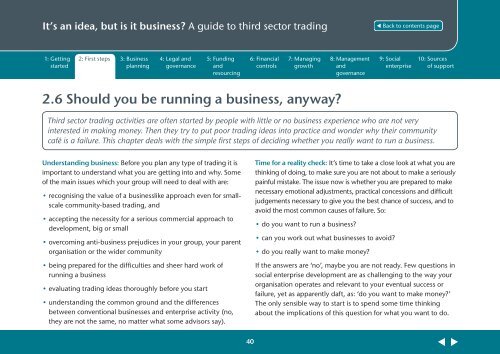A guide to third sector trading - WCVA
A guide to third sector trading - WCVA
A guide to third sector trading - WCVA
You also want an ePaper? Increase the reach of your titles
YUMPU automatically turns print PDFs into web optimized ePapers that Google loves.
It’s an idea, but is it business? A <strong>guide</strong> <strong>to</strong> <strong>third</strong> sec<strong>to</strong>r <strong>trading</strong><br />
1: Getting<br />
started<br />
2: First steps 3: Business<br />
planning<br />
4: Legal and<br />
governance<br />
5: Funding<br />
and<br />
resourcing<br />
6: Financial<br />
controls<br />
7: Managing<br />
growth<br />
8: Management<br />
and<br />
governance<br />
9: Social<br />
enterprise<br />
10: Sources<br />
of support<br />
2.6 Should you be running a business, anyway?<br />
Third sec<strong>to</strong>r <strong>trading</strong> activities are often started by people with little or no business experience who are not very<br />
interested in making money. Then they try <strong>to</strong> put poor <strong>trading</strong> ideas in<strong>to</strong> practice and wonder why their community<br />
café is a failure. This chapter deals with the simple first steps of deciding whether you really want <strong>to</strong> run a business.<br />
Understanding business: Before you plan any type of <strong>trading</strong> it is<br />
important <strong>to</strong> understand what you are getting in<strong>to</strong> and why. Some<br />
of the main issues which your group will need <strong>to</strong> deal with are:<br />
• recognising the value of a businesslike approach even for smallscale<br />
community-based <strong>trading</strong>, and<br />
• accepting the necessity for a serious commercial approach <strong>to</strong><br />
development, big or small<br />
• overcoming anti-business prejudices in your group, your parent<br />
organisation or the wider community<br />
• being prepared for the difficulties and sheer hard work of<br />
running a business<br />
• evaluating <strong>trading</strong> ideas thoroughly before you start<br />
• understanding the common ground and the differences<br />
between conventional businesses and enterprise activity (no,<br />
they are not the same, no matter what some advisors say).<br />
Time for a reality check: It’s time <strong>to</strong> take a close look at what you are<br />
thinking of doing, <strong>to</strong> make sure you are not about <strong>to</strong> make a seriously<br />
painful mistake. The issue now is whether you are prepared <strong>to</strong> make<br />
necessary emotional adjustments, practical concessions and difficult<br />
judgements necessary <strong>to</strong> give you the best chance of success, and <strong>to</strong><br />
avoid the most common causes of failure. So:<br />
• do you want <strong>to</strong> run a business?<br />
• can you work out what businesses <strong>to</strong> avoid?<br />
• do you really want <strong>to</strong> make money?<br />
If the answers are ‘no’, maybe you are not ready. Few questions in<br />
social enterprise development are as challenging <strong>to</strong> the way your<br />
organisation operates and relevant <strong>to</strong> your eventual success or<br />
failure, yet as apparently daft, as: ‘do you want <strong>to</strong> make money?’<br />
The only sensible way <strong>to</strong> start is <strong>to</strong> spend some time thinking<br />
about the implications of this question for what you want <strong>to</strong> do.<br />
40












